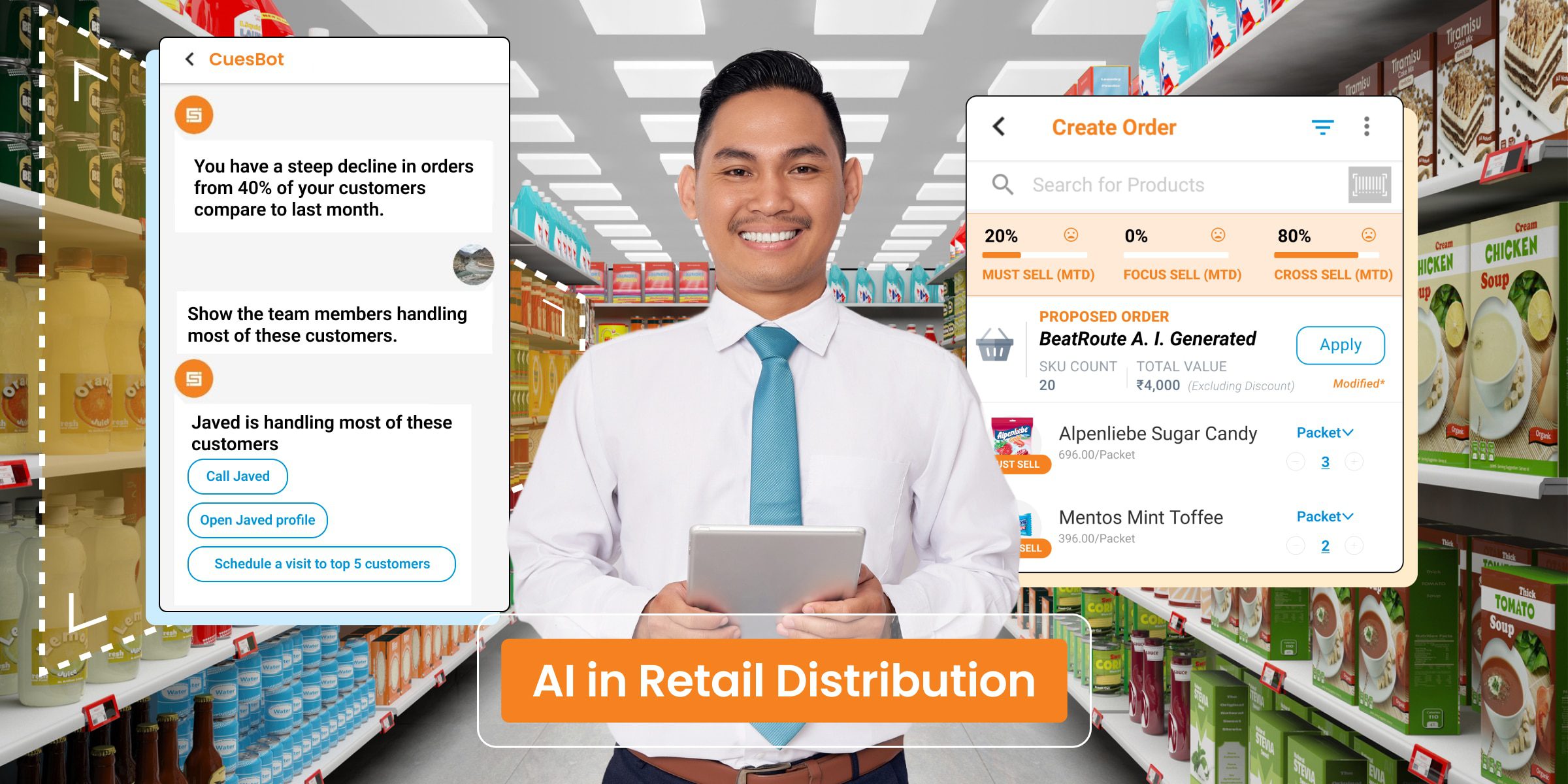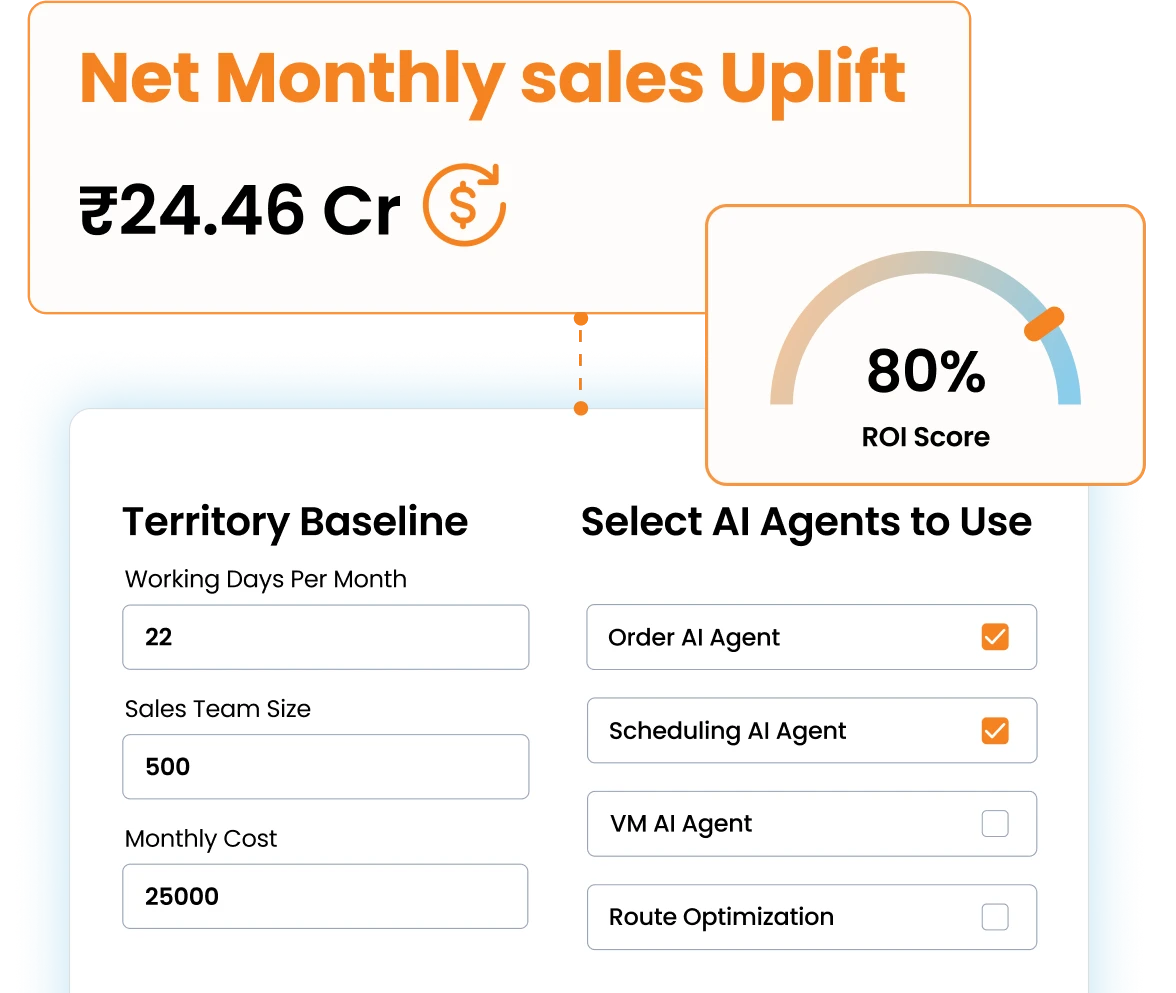Why Generic AI Fails in Executing Retail Distribution Strategies

One of the buzzwords you will find making the rounds in retail distribution today is artificial intelligence or AI. Everyone is peddling the same deal – “we have AI capabilities that can elevate your sales like never before.”
But when it comes to application, you realise that a generic AI is not enough. It cannot accommodate the dynamic needs of your business. You need a more intelligent approach to achieve that.
Generic AI often has limited capabilities when it comes to tailoring solutions to unique industry specific business needs. This leads to lost opportunities to solve problems. It also hinders the ability to upsell or cross-sell. To put things in perspective, generic AI relies on general purpose models. These models have little to no customisation capabilities. This makes them generally unable to meet specific business or industry needs.
Unless an AI gives actionable insights by inferring from data, sales teams are left wasting time deciphering information instead of crafting solutions to “course correct” and improve revenue.
However, you can avoid all this chaos by implementing a specialised AI designed to help your holistic sales goals by boosting your operational efficiency and supporting retail distribution efforts.
In this article, we will discuss how implementing tailored AI strategies can help you bridge the gap between raw data and effective decision-making and its advantages to your RTM (Route-To-Market) strategy.
Why Specialised AI Outperforms Generic AI Solutions
Consider that a retail store hasn’t ordered from you for a longer period than usual, based on historical data and their sales potential. Something’s gone wrong but according to your visit frequency for this store, your sales rep isn’t due there for another week.
A regular, generic AI doesn’t flag this as an issue and sales reps go about their daily visits using their own intuition and understanding. This is because generic AI models lack specific industry knowledge or training needed for contextual analysis.
For instance, the FMCG industry has fixed beat plans for its sales reps while the building materials industry has visit frequencies but leaves actual visits to sales rep discretion. A specialised AI like BeatRoute’s ‘Help Me Plan’ feature would recognise this difference and accordingly provide industry-specific insights or recommendations regarding visits.
Here is a table to differentiate between a generic, run-of-the-mill AI and an AI that provides real value to your operations:
| Generic AI | Tailored/Specialised AI |
| Offers surface-level solutions without the deep understanding of industry-specific challenges, requiring frequent and significant customisations to be effective. | Highly focused AI system tailored to the unique demands of retail distribution, such as optimising routes, tracking inventory, and tracking sales that a generic AI just can’t do from the get go. |
| Limited in its understanding of retail concepts like face count, competitor offerings, and shelf space, necessitating a lot of fine-tuning. | Benefits store audit process by reducing audit cost, identifying face counts of both your and your competitor’s offerings, and detecting share of shelf non-compliance, etc. |
| One-size-fits-all approach that is unable to help with specific industry niches. | Solutions specific to your sales and distribution needs. |
| Simply determines the shortest route from point A to point B or between stores. | Can help with route optimisation by considering factors like sales performance, visit frequency, payments, order patterns. |
| Needs extra setup and customization or effort/training to adapt to specific tasks. | Ready to use as it’s designed to work in a particular industry. No time wasted for adaptation. |
| Presents data but not necessarily insights/suggestions. | Insights and suggestions for retail sales and distribution improvement. |
| Can be more expensive in the long run because of a continuous need to train and customise it. | AI that’s pre-designed or configured for retail sales and distribution is cost-effective. |
How Can AI Help You?
We must understand that AI is just a tool and doesn’t represent your whole RTM strategy. To get maximum impact out of it, your AI must be trained or configured for your brand/industry/needs and be able to generate actionable insights or suggestions from available data. This enables you to identify issues in your route to market for prompt resolutions.
AI alone cannot boost your sales, you need human intervention to make it all come together. This is because a sales team is capable of physical activities that an AI cannot accomplish, such as face to face interactions, relationship building, and conversations with significant psychological effects on customers and/or channel partners.
On the other hand, overlooking AI or investing in one that is not tailored to your RTM needs is a half-baked strategy that can negatively affect your sales. But most AI in the market are pretty rudimentary or highly generalised in their functions. They don’t really help you because they are not made for you.
Contrarily, an AI that is crafted or configured keeping your goals in mind, provides many benefits and is mentioned in the following list:
- Ordering – AI can help your goals by recommending the most tailored order baskets or products to a customer. Any successful business transaction involves your sales reps pushing only those products that fit the purchase trends or sales capabilities of a store.
Any deviation and you will see a loss in brand value and a loss of repeat sales. You can’t rely on human memory and intuition alone to drive product combinations for dozens of stores per sales rep.
That’s one of the areas where our operational AI excels – it removes the need for your sales reps to remember store-specific product combinations and recommends order baskets based on not just past purchases but also on what other retailers are buying in the same area.
- Analytics – AI enhances data analysis by identifying sales trends and customer buying patterns, enabling data-driven decision-making and planning, as opposed to supposition. Analytics are crucial to infer from raw data and AI is best suited to do this because it is free from the limitations of oversight and bias that could affect the result.
Your sales managers, for example, can get immediate notifications on store issues or your sales rep can leverage analytics to allow them to prevent stockouts, loyalty issues, and dissatisfaction among distributors and retailers. - Inventory checks/tracking – Monitor stock levels, detect shortages, and help with quick replenishment by notifying all stakeholders, reducing the stockouts or overstocking.
For example, consider the immense advantage your brand has when every relevant team or manager is notified of a stock deviation so that replenishment can happen promptly. BeatRoute’s conversational AI, also called CuesBot, is designed to do precisely this.
- Visiting Planning – In many industries such as Building Materials and Consumer Appliances, visit plans are not fixed. Sales reps and managers decide which route or stores to visit on a given day based on their own understanding. Even in the FMCG industry, managers typically do not follow fixed visit plans.
Factors to be considered for priority could be visit frequency or a sudden decline in sales or outstanding payments or any other business concern. AI can be used to suggest high priority routes or stores to sales teams in such cases.
For example, our “Help Me Plan” feature prioritises high-impact visits by analysing factors or issues such as pending payments, sales decline, etc., enhancing productivity and in turn, revenue.
- Demand forecasting – AI can also analyze historical sales data, market trends, etc. to to predict future demand, helping brands stock the right products at the right time. An example would be seasonal demands like on Christmas that may involve the sale of certain fruit cakes more than at other times.
- In-store auditing – AI enables automated checks for VM compliance during store audits, such as share of shelf, planogram, and face count. This not only ensures that your VM strategy is always on point, but you also get reliable data at reduced cost.
Conclusion
It is clear at this point that AI and digitisation are unavoidable parts of any successful sales strategy; any modern route to market leverages these for success. It is an important part of your arsenal to get your products to consumers successfully and consistently.
While sales teams may depend on AI for field support and to do their job better, AI depends on human field work/inputs/store visits/ to accrue data for analysis. A potent symbiosis as long as you implement specialised AI that is configured to work within your industry needs.
AI is the future of retail distribution not just because everyone is already using it, with varying results, but also because of how fast it’s improving. Shortcomings are being ironed out and it is becoming more and more a part of retail activities everyday.
Therefore, operating on a strictly traditional set up with legacy systems is no longer an option if you want to be successful.
If this excites you, go ahead and try our free demo!
About the Author
-

Apart from being a Senior Content Writer at BeatRoute, Soham is an avid reader of science fiction and suspense novels (Doyle, Christie, Brown or anybody great!) He also dabbles in historical narratives and wonders about our place in the universe. Cosmic viewpoints, Carl Sagan, and Neil deGrasse Tyson intrigues him. When not reading, you may find him spending his weekends or after-work hours watching a fulfilling movie with his family.
Use Goal-Driven AI to Achieve Retail Sales Uplift, Today!
Join enterprises in 20+ countries that trust BeatRoute, the globally dominant AI platform for sales force automation, field sales, DMS, and eB2B
Latest Insights & Articles
Here are the most impactful articles, platform updates, ebooks and reports for you.


